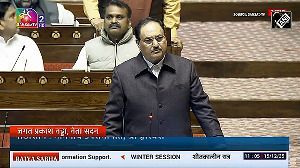Foreign cigarette companies could soon find it harder to sell their products in India. The government is looking into a proposal to ban foreign direct investment (FDI) in the wholesale marketing arms of these companies. It is also exploring the possibility of shifting the import of tobacco products from the open general licence (OGL) to the restricted list.
It is also exploring the possibility of shifting the import of tobacco products from the open general licence (OGL) to the restricted list.
Both moves will impact companies like Japan Tobacco International, Philip Morris and others that have set up fully-owned marketing subsidiaries through which they not only sell their global brands in the domestic market, but also bring in funds to support local operations.
After more than two years of deliberations, the government banned FDI in the manufacture of cigarettes last year.
Despite this, however, the health ministry and NGOs have complained that foreign cigarette companies use the marketing services route as a back door for investment and to support sales in India.
Japan International, which has a 50 per cent stake in joint venture JTI India to manufacture cigarettes in India, last year set up JTI Wholesale India - a wholly-owned subsidiary - through which it can continue to bring money into the country and sell its products in the wholesale market.
Philip Morris, which has a minority stake in Godfrey Phillips India controlled by the K K Modi group, has set up IPM Wholesale Trading - in which it is a majority shareholder - to promote its international brands.
The department of industrial policy & promotion under the ministry of commerce has suggested that existing policy, which allows 100 per cent FDI in wholesale trading, should be amended to exclude tobacco.
DIPP has also suggested that tobacco products be excluded from the OGL list to make symmetric its treatment vis-à-vis imports.
That would plug the possibility of new foreign companies using a combination of the two routes to sell tobacco products in India.
The department of economic affairs feels that the ban on FDI in manufacturing does not adequately guard against circumvention by foreign tobacco companies by using the marketing services route. It argues that the ban should be extended to marketing.
The government has also roped in the department of corporate affairs to plug another innovative loophole used by Japan Tobacco to bring in Rs 300 crore (Rs 3 billion) for its JV through differential rights issue pricing without increasing its stake.
The company chose this route after a proposal to increase its stake from 50 to 74 per cent in the Indian manufacturing venture was rejected.
Under the offer, the Indian JV issued fresh equity of Re 1 each to JTI at a premium of Rs 298, amounting to Rs 293 crore (Rs 2.93 billion).
It issued an equal number of shares to its Indian partners, the Thakkar family, which paid only Rs 1 crore for the shares, as they were issued at par.
By issuing the shares on a differential basis, the company ensured the infusion of more capital from the foreign partners without any increase in shareholding.
However, deliberations within the finance ministry noted that under the Foreign Exchange Management Act, there is no provision on differentiated pricing and that any possible violation cannot be checked under such pricing guidelines as share premium cannot be identified with ownership.
It has argued that the issue here is not of control, but whether such a transaction is logically correct. The basic concern is the legality of the transaction, which has to be examined by the department of corporate affairs.






